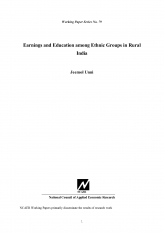Earning and Education among Ethnic Groups in Rural India
November 2001
In rural India access to education could act as a catalyst to change. Persons acquiring education could break through some of the social and cultural norms associated with certain occupations. However, access to education and the capacity to use it for economic betterment could differ by caste and religion. In independent India, social policies such as the reservation of seats in higher education and jobs in the public sector were intended to help break some of these entry barriers for communities facing centuries of social exclusion and discrimination. The focus of this paper is on the premium on income associated with educational investment and how this varies with ethnic groups. The probit regressions indicated that education, even at the primary level, increased the probability of obtaining a highly coveted salaried job. A ‘circle of contacts’, through other family members engaged in such jobs, also increased access to a salaried job. Educational attainment, even at very low levels, was a definite route out of poverty for the Scheduled Caste and Tribe households. Aided by the reservation policy, these communities were able to obtain salaried jobs and reap high returns to education. However, when forced to undertake self-employed activities in non-agriculture they did not fare well.
Human Development and Data Innovation







